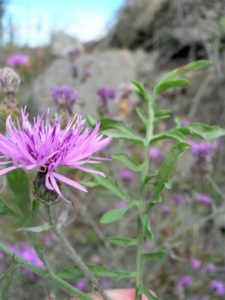Spotted Knapweed Removal at Kitchel-Lindquist-Hartger Dunes Preserve!
On The Water (OTW) has partnered with the Kitchel-Lindquist-Hartger (KLH) Dunes Preserve for a volunteer invasive species pull! Founded in 1971, the KLH Dunes Preserve consists of 115 acres of a freshwater dunes ecosystem, and it is managed with the mission of “site restoration, stewardship, land protection, and education”.
On Saturday, July 25th, volunteers will gather to remove Spotted Knapweed from sensitive areas on the dunes. Spotted Knapweed is an invasive species that has been established in Michigan and is harmful because it can spread easily and disturb surrounding native plants. To learn more about how to identify Spotted Knapweed and the negative impact it can have on an ecosystem click here .
 Volunteers will meet in the parking lot at 9:00 on Saturday, July 25th, and then proceed to the worksite to begin pulling Spotted Knapweed. All the necessary personal protective gear such as gloves, buckets, trash bags, sunscreen, and bug spray, will be provided on a first-come-first-serve basis. Boxed lunches will be provided for all volunteers as well as an OTW gift bag with a reusable water bottle and stickers to take home at the end of the event. To register to volunteer, please click her
e.
Volunteers will meet in the parking lot at 9:00 on Saturday, July 25th, and then proceed to the worksite to begin pulling Spotted Knapweed. All the necessary personal protective gear such as gloves, buckets, trash bags, sunscreen, and bug spray, will be provided on a first-come-first-serve basis. Boxed lunches will be provided for all volunteers as well as an OTW gift bag with a reusable water bottle and stickers to take home at the end of the event. To register to volunteer, please click her
e.
In response to the current global pandemic, volunteers are encouraged to abide by the current guidelines established by the Center for Disease Control (CDC) and the State of Michigan during this event. Please refer to the CDC website and the most recent Michigan Executive Order for more details.
OTW is very excited about this event, as it is the only invasive species removal on the 2020 event calendar. All are welcome to come and help out, it will be a wonderful opportunity to get outside and be a steward of the local dune habitat.
Please contact Joe Dewan at AmeriCorps@mucc.org , if you have any further questions.
The post Spotted Knapweed Removal at Kitchel-Lindquist-Hartger Dunes Preserve! appeared first on Michigan United Conservation Clubs.
Recent Posts



